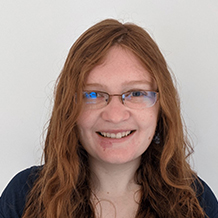Sarah Forrester
Lecturer
Teaching and scholarship
![]()
I aim to create an inclusive and welcoming learning environment for students in which they can develop their confidence and have fun engaging with their learning material. My teaching is closely related to my research which is data driven and I want to encourage and inspire students to develop non-coding specific skills such as problem solving and critical thinking. Most biological understanding is underpinned by data that has been generated. Understanding how to appropriately analyse and present data is increasingly more important as recent technological advances in biology have led to an explosion in the amount of data available. My research and teaching enables students to use their biological understanding to apply and critically evaluate their results within its biological context.
![]()
I appreciate that students can find coding to analyse their data very daunting at first, and so I try to find ways to make my teaching more hands-on and engaging. My teaching does include lecture elements to cover biological or statistical concepts, but I also have lots of workshop style teaching where students can work at their own pace and learn through actively doing analysis themselves. I like to encourage an environment where students are comfortable to try new things, make mistakes, and learn from them. My research background is in microbiology and genetics, so the analyses/statistical approaches that I teach are centred around these themes.
![]()
My tutorials are based on how to manipulate and analyse data and understand which statistical methods are the most appropriate. I also work with students on how to best present and visualise their data and how best to communicate their results effectively.
![]()
My projects focus on the microbial interactions underpinning the process of anaerobic digestion (AD). AD is the process of breaking down organic material under anaerobic conditions and is facilitated by microorganisms. This process is performed at scale to recycle organic wastes such as sewage, food waste, and crop waste, with the downstream products used to generate green energy and other products such as fertiliser. The organisms facilitating this process are poorly described but we know that anaerobic digester communities are complex and potentially contain hundreds of organisms. I am interested in understanding the functional abilities of organisms within these communities and how they contribute to the community as a whole. These projects are bioinformatics based and utilise sequencing data to identify these community dynamics. These projects are ideal for students with an interest in microbiology/genetics/biotechnology or those interested in developing data science skills.

